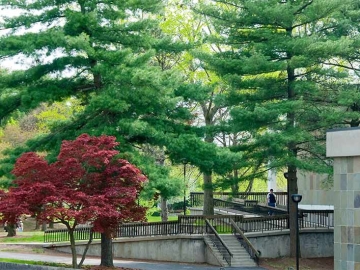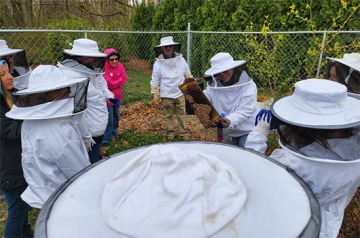
Our Environmental Studies BA May be Perfect for You
Our Environmental Studies Bachelor of Arts degree focuses on human interaction with the environment and how we can move toward a sustainable future.

A federally recognized Green Ribbon School, RIC is committed to being a model for sustainability. From decreasing energy usage to nurturing pollinators to sourcing locally grown foods, we are actively demonstrating our commitment to the environment today for a brighter, cleaner tomorrow.

We take great pride in our sustainability efforts and the results we've achieved, while recognizing that green commitments are continuous and ever evolving.
Our campus is a Level I Arboretum accredited by ArbNet, hosting 58 different species of trees, more than half of which are not native to RI.

RIC is home to the RI Bee Education Center and four hives housing around 15,000-20,000 bees each. Bees outnumber people on our campus!
RIC graduates cross the stage wearing GreenWeaver® regalia, made entirely of recycled plastic bottles. Since 2011, we’ve kept more than 300,000 bottles out of landfills by upcycling them into caps and gowns.

Donovan Dining, our 4 Star Certified Green dining hall, sources food from our campus garden, uses honey from our on-campus beehives, has a rooftop solar array, and converts cooking oil into clean-burning fuel for homes and vehicles.
50 water bottle filling stations on campus have kept more than 1 million single-use bottles out of our landfills.

Our Environmental Studies Bachelor of Arts degree focuses on human interaction with the environment and how we can move toward a sustainable future.
During days of extreme heat or cold, RIC works with CPower to divert energy from our school to places that need it more – like Roger Williams Hospital. A lot of energy is used during intense weather, which can stress the power grid and lead to outages. To avoid outages in critical spaces like hospitals, the “Demand Response” program allows us to reduce and redirect our energy and be rewarded for it.
Rhode Island College is en route to becoming 100% LED lit! LED light bulbs can last around 10 years longer than normal bulbs, reducing the waste and maintenance cost that comes from replacing normal bulbs. Additionally, many buildings on campus use energy efficient lighting, using occupancy sensors to automatically shut off the lights when rooms are empty.
A 110kW Solar Array was added to the roofs of Donovan Dining Center and the Student Union to create a source of energy that is both green and cost effective.
The Donovan Solar Array generates the most energy during daylight savings time between March and November, with about 8 tons of carbon emissions being avoided and 18 MWh of energy being generated every month.
Additional solar panels will be added to other campus buildings as they are renovated.
Most campus computers have power management software installed that will automatically manage the power the computer uses to reduce energy usage. With approximately 1,700 computers on campus, this translates to considerable energy reduction and cost savings.
During the remodeling of Horace Mann, old classroom and office furniture was saved and given to schools in Central Falls and Providence. Instead of ending up in the landfill, this valuable equipment went on to live another life in classrooms that would benefit from the donation.
The Donovan Dining Center partners with Newport Biodiesel to convert the cooking oil from RIC into clean burning Biodiesel to heat homes and power vehicles throughout Rhode Island. Biodiesel is a renewable, non-toxic, locally produced fuel that can be used in any diesel engine or oil furnace.
RIC has an electronic building management system in place that is used to control the heating, ventilation, and air conditioning in all major buildings on campus. This system allows for energy savings by programming the systems in coordination with classroom and event schedules. The system is managed from a desktop computer and in many buildings temperatures can be controlled down to an individual room level. Room and building temperatures have different set points depending on whether they are occupied and unoccupied.